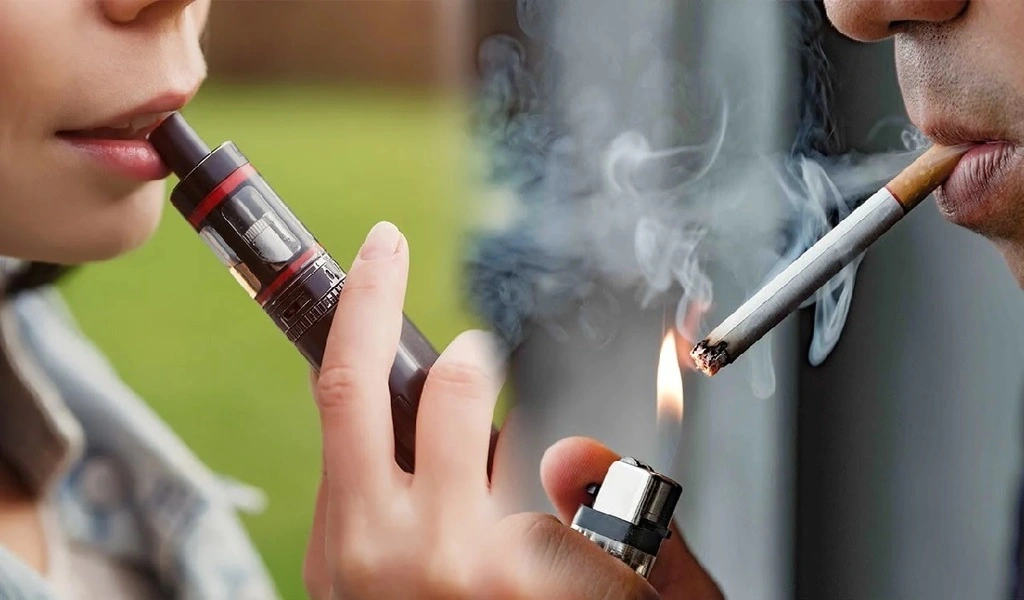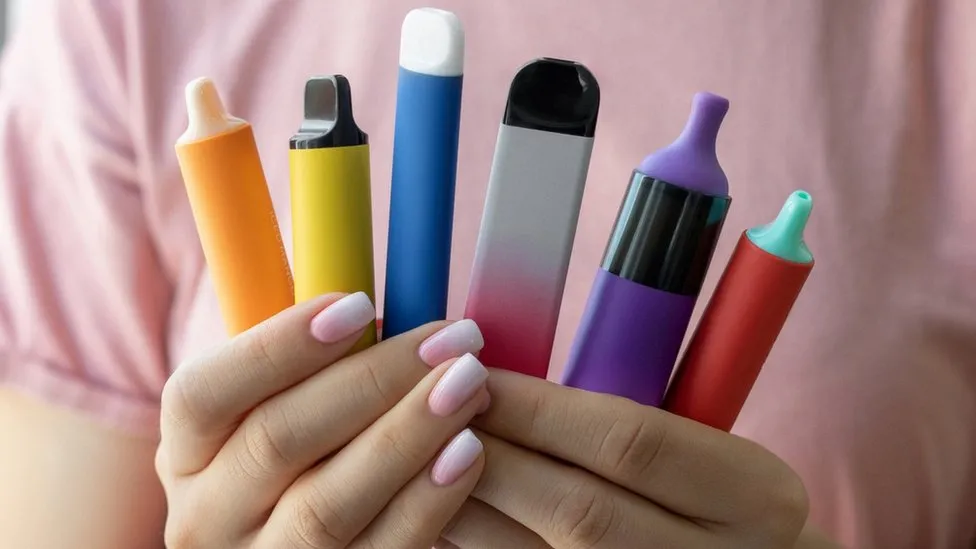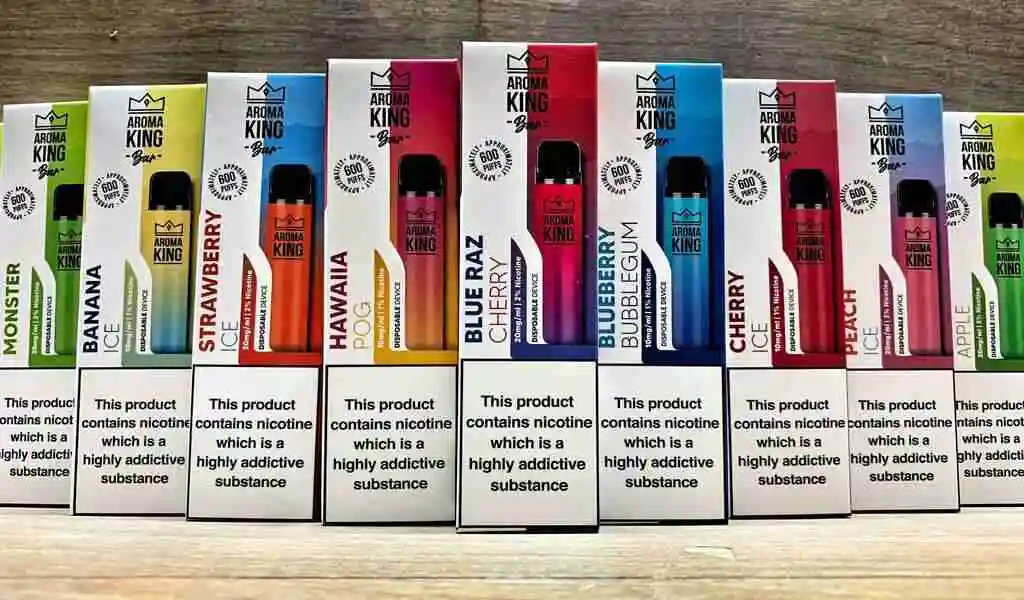(CTN News) – The government says disposable vapes would be prohibited as part of attempts to combat the growing number of young people who vape.
Measures will also be implemented to prevent vapes from being advertised to youngsters and to target underage sales.
Prime Minister Rishi Sunak said that adult smokers attempting to stop will still have access to alternatives such as vapes under the proposals.
According to the government, the prohibition is set to be implemented throughout the UK.
It is already illegal to sell any vape to anybody under the age of 18, but disposable vapes, which are sometimes presented in smaller, more colourful packaging than refillable vapes, are a “key driver behind the alarming rise in youth vaping,” according to government officials.
According to the Action on Smoking and Health (Ash) charity, 7.6% of 11 to 17-year-olds vape on a regular or occasional basis, up from 4.1% in 2020.
On Monday, Mr Sunak announced the proposals, saying it was appropriate to take “strong action” to combat vaping in minors.
“Children shouldn’t be vaping; we don’t want them to get addicted, but we still don’t understand the full long-term health impacts,” he went on to say.
Mr Sunak suggested that the recommendations struck the appropriate balance between restricting access for youngsters and keeping access for adult smokers attempting to quit smoking.
“It is important that we maintain vapes for adult smokers who want to stop,” the Prime Minister added, adding that he intended to address “all the things that make sure children don’t have access to vapes.”
Campaigners argue that disposable vapes are wasteful and pose challenges for safe disposal due to materials like lithium batteries.
According to the NHS, while vaping is significantly less dangerous than smoking, its long-term consequences are unknown.
The vapour that is breathed may still contain trace amounts of compounds found in cigarettes, including nicotine, which is addictive but not regarded by the health service as one of the most hazardous elements in cigarettes.
The plans come following last year’s declaration of a ban on cigarette sales to anybody born on or after January 1, 2009, as part of an effort to establish a “smoke-free generation”.
Victoria Atkins, the Health Secretary, told the BBC that the new bill would pass Parliament by the time of the general election, which is likely to be held this year, and would go into effect in early 2025.
Once the schedule has been verified, shops will have six months to execute it.
Sir Keir Starmer, Labour leader, said he supported a ban on disposable vapes but condemned the government’s two-year delay in implementing legislation.
He also criticised ideas that Tory MPs may be given a free vote on the matter, allowing them to vote according to their conscience rather than the party line.
The bill might be introduced under existing environmental legislation.
Campaigners have long maintained that disposable vapes are wasteful and that the materials and chemicals used to manufacture them, including lithium batteries, make them impossible to dispose of properly.
The most recent revisions would also prohibit refillable vapes from being sold in flavours promoted to children and require them to be created in plainer, less appealing packaging.
The government will also be able to require businesses to display refillable vapes out of sight of children and away from other things kids may purchase, such as candy.
The government will hold another public consultation to determine which flavours should be banned and how refillable vapes will be sold.
To help prevent underage sales, extra fines will be imposed on any shops in England and Wales that sell vapes illegally to youngsters.
Matt Carpenter, head teacher at Baxter College in Kidderminster, told BBC Radio 5 Live that vaping is a “huge part of youth culture” and that the proposed ban on disposable vapes is a “significant step forward.”
Glyn Potts, the head teacher of Oldham’s Newham Catholic College, said action was needed to prevent children from being “bombarded” with “attractive” products on social media and in stores throughout the UK.
He also told BBC Radio 4’s Today programme that there was evidence that certain vape pens had been repurposed to include “cannabis derivatives” that may hospitalise young people.
Children will also be prohibited from using vaping alternatives such as nicotine pouches, which are little white pouches placed between the lips and gum. The pouches deliver nicotine but contain no tobacco thus they can currently be lawfully sold to those under the age of 18.
Health officials will be careful to ensure that the new regulations do not make it more difficult for adult smokers to switch to vaping as an alternative.
This is where consultation on how far to go with restrictions on store tastes and displays will be critical.
The statement follows an initial consultation launched late last year by the UK government and devolved administrations to evaluate public sentiments towards potential measures to curb smoking and vaping.
The government reported that over 70% of respondents favoured a ban on disposable vapes.
The Scottish and Welsh governments have stated that they would implement prohibitions through legislation in their parliaments or by backing UK-wide measures.
Northern Ireland still lacks a devolved administration due to a breakdown in power sharing, but its Department of Health stated it had “a long-standing strategic aim” to be tobacco-free and would make plans to allow incoming ministers to decide on the ban.
The UK joins a small group of countries, including Australia, France, Germany, and New Zealand, in planning to ban disposable vapes
The United Kingdom has joined a small group of countries that seek to prohibit disposable vapes. Australia, France, Germany, and New Zealand have all declared identical ideas, but only New Zealand has executed them.
Some would claim that the UK’s plans aren’t ambitious enough. There have been proposals to charge e-cigarettes to bring them in line with tobacco, and Australia has made vapes only available with a prescription.
Deborah Arnott, CEO of Ash, praised the government’s policy, while Dr Camilla Kingdon, head of the Royal College of Paediatrics and Child Health, stated that creating a “smoke-free generation” will lower young people’s chances of getting preventable diseases later in life.
However, the UK Vaping Industry Association was “dismayed” by the move, noting that disposable vapes have “played a key role in helping millions of adults quit and stay off cigarettes”.
It instead called for better enforcement of existing rules, calling the measures as a “desperate attempt by the government to sacrifice vapers for votes” that would endanger children by “turbocharging the black market.”
Elf Bar, one of the country’s largest vape makers with sibling brand Lost Mary, said it supported the government’s desire to prevent youngsters from using vapes but was disappointed “with the outright ban”.
The UK arm of British American Tobacco, the third-largest participant in the disposable market, argued that stronger controls on “importation, appeal, and access” would “more effectively reduce under-age use”.
Some prominent vaping companies’ shares fell sharply in early trade on Monday.
Trading Standards officers believe more resources and time are required to crack down on illegal retailers.
Local authorities can issue a maximum punishment of £2,500, and the government promised a £30 million enforcement package in October.
Meanwhile, former Prime Minister Liz Truss slammed the government’s proposed prohibition on the sale of tobacco products to minors, calling it “profoundly unconservative”.








